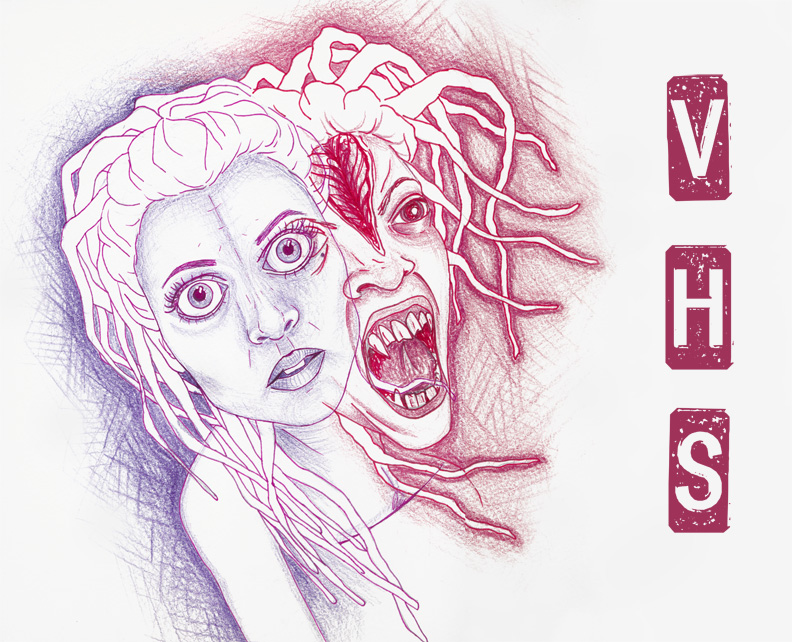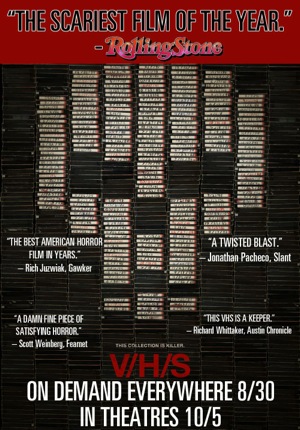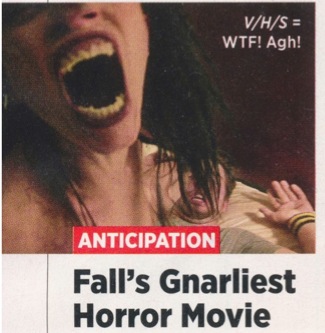Nick Tecosky
Exclusive Interview With "V/H/S" Writer Nick Tecosky
13/06/13 20:56 Filed in: Misc.

I realize “V/H/S2” just came out, but having seen and thoroughly enjoyed both the sequel and the original “V/H/S,” I can honestly say you are unlikely to find anything as disconcerting between the two of them as “Amateur Hour,” which was written by Nick Tecosky and David Brucker. It is no secret that “Amateur Night” is one of the most popular entries from the horror anthology “V/H/S.” Indiewire called it “the standout of the bunch”; “First and best is ‘Amateur Night’ …” boasts Variety; and the Boston Globe states: “ ‘Amateur Night’…is the compilation’s nonpareil.” Equally frightening and revulsive, “Amateur Night” is the first film that has scared me in a long time. In fact, I had that same reaction watching it that I did when I saw the chestbuster scene in “Alien” as a kid: “Who the hell thinks of this stuff!?”
Enter Nicholas Tecosky, co-writer of “Amateur Night” (along with David Bruckner). Nicholas was nice enough to grant an exclusive interview to AllGoodThings.tv to talk about the project.
Q: So how did “Amateur Night” come about - e.g., how did you guys come up with this story? Take it back to the very beginning if you would and tell us how you guys decided on the plot. On the Blu-ray commentary, Bruckner mentions the concept of the male gaze being an inspiration; can you expand on that? I suppose this question also encompasses the mechanics of your writing partnership with Bruckner and how guys crank out a script (e.g., do you alternate writing scenes?)
A: When we were first approached about submitting a story, we did what we usually do, which is to camp out in the office or someone's living room for a few days eating poorly and throwing ideas at each other until something sticks. We'd been interested for a while in the way we interact with media, and how it changes our minds and expectations-- particularly in the area of sexuality. And so we kept coming back to this story about Spring Break culture, and the damaging-- even toxic-- ideals that "reality porn" has instilled on a generation of young men. And the story grew out of that. Once we had the idea solidified, we spent two days grinding out an initial treatment to send out to the producers. It's a touchy subject, and more than a few times we found ourselves stopping and looking at each other, asking if maybe we were pushing it a little too far, if maybe the satire we were trying to layer in was too subtle, if the image of a man's naked body being torn apart was a bit heavy-handed... I guess it's obvious where we landed on that one. And once we were given the go ahead, we got to the real writing.
We tend to do the heaviest lifting during the outlining process. We don't like to write pages until all of the structure problems have been answered. There's nothing worse than getting to the third act of a screenplay and realizing that you have no idea how to tie all of the threads together. At that point, you have to take it back to outlining anyway, so why not do the footwork up front? Once that's done, we tend to split up scenes and work separately, and then passing them back and forth, refining each other's work, until we're both happy with what we've done. "Amateur Night" was a little different for us, in that- once we had a draft of the script and everything was cast- we ended up tossing it aside in rehearsals and instead working with the cast on tightly structured improvisation. Certain lines and salient points were kept in, but we gave the cast a lot of latitude to discover moments on their own. I think that with found footage, it's hard to keep the performances realistic unless the performers are allowed the leeway to explore and spontaneously discover moments. It was daunting as a writer, but ultimately, between our structure and their performance, we came up with something very dynamic.
Q: How much of Lily’s character was already on the page as opposed to being developed subsequent to Hannah Fierman being brought on? For instance, was the line “I like you…” in the original script or was that something that came about later, after Fierman was hired. Other baffling Lily quirks include her crouching down immediately after leaving the club and wanting to perform fellatio on Drew Sawyer’s character after making meatloaf out of his friends. One of the questions I hear repeatedly and I’ll ask you here is: “If [Drew’s character] had reciprocated Lily’s affections, would she have let him live?” (I suppose it's possible she did let him live, although it seems doubtful.)
A: The casting on this was really strange: We had a solid picture of each one of the characters in our heads when we started seeing actors, and in the case of Hannah Fierman, it was sort of like hitting the jackpot. We'd thought that casting the role of Lily was going to be the hardest aspect, and then she walked in and gave us exactly what we were looking for. And then some. And "I like you" was in the original script, but it certainly didn't have the weight on the page that Hannah endowed it with. I think that I was a little scared of her the first time she said it aloud. In other cases of casting-- most notably with Joe Sykes, we were surprised to find that there was a completely different take on the character than the one we'd first imagined. In the original script, his character is described as a sort of creepy, brooding ex-high school football player who'd let himself go, and just skulks around in the shadows. He was a predator. A clear threat. And then Sykes walks in and plays him as this manic, affable guy, and when he leaves, we can't see the character any other way. Joe lends the proceedings a levity that wouldn't have been there had we gone with our original take on Patrick.
As far as our protagonist's fate, we like to think that maybe she brought him back to the nest. Introduced him to mom and dad. Maybe domesticated him. Settled down and had a family. I really do believe that Lily liked him, despite obvious issues with his friends. But I think a lot of relationships work that way.
Q: How did “Amateur Night” come to be selected for “V/H/S” by the producers and how were notes given by them? In the Blu-ray commentary Bruckner said that he was given notes that Fierman’s leap onto Joe Sykes needed to be amped up. Were you guys given notes on the screenplay as well before shooting?
A: This was sort of an atypical experience, in that- once they'd approved of our story- we were given a tremendous amount of freedom in how we executed it. And the whole process moved at such a breakneck pace that most notes weren't given until we were in post. And by that point, many of the notes were about tightening things, and pumping up the tension. We were very lucky to be given that kind of trust to make what we wanted to make.
Q: Tell me a little about your background as a writer, such as prior projects and how you decided on writing as a career. Do you see yourself sticking to the horror genre or are you looking to write other genres?
A: I'd studied theater originally, and out of school, my first job was actually writing children's theater for a large company that owns theme parks across the nation. So for years, I was writing about finding the true meaning of Christmas, adapting fairy tales for a very young audience. In the meantime, I was spending nights adapting William S. Burroughs pieces to stage or writing horror with Bruckner. Looking back, it felt a bit like living a double life, but when it comes down to it, there's a surprisingly thin line between children's theater and horror. It's all couched in the fantastic. In a world that exists just beyond the border of our mundane lives. I grew up reading fantasy and horror, and always had a strong desire to see that world. I knew it was there, if I looked hard enough or did the right things. As I got older, I realized that maybe I had to make that world for myself.
But I enjoy writing horror. It's an excellent way to explore the very real anxiety we feel about our lives and the world we move around in. We live in troubling times. Everyone's nervous about the future. Or maybe I'm just really neurotic. Maybe everything's okay. I don't know.
Q: Bruckner notes in the Blu-ray commentary that you guys had an entire backstory worked out for Lily. (He also said that it was something you guys plan to never reveal.) That said, is it possible to get a little more about her origins? I’m sure lots of fans would like to know what type of creature you had in mind – I see succubus bandied around a lot on the net.
A: We did work out a backstory for her, though it was done mostly so that we would understand fully what we were working with. We never saw her as an evil creature. There is a real tenderness there. In order to really have that play naturally, you've got to have context. We worked with the idea of the foreign exchange student, or the anthropologist coming to study a culture alien to them and getting too close. We did, obviously, look at the succubus as something of a model-- we named her Lily, after all. As for the specific details of where she came from, I'll leave that up to the audience's imagination. I really do believe that the more information given about your antagonist, the more you demystify her, the less scary she is. That's why the first season of American Horror Story stops being scary after a few episodes, and just ends up being a particularly engaging soap opera about dead people.
If anybody absolutely, desperately needs to know Lily's backstory, find me and get me drunk. I'm a talker when I've had a few.

A: The Haunting (the original version) is one of the coolest haunted house films out there. It's a great character study, and considering that you never actually see the specter that wanders the place, or have any idea of what it wants, builds tension incredibly. The scene wherein Julie Harris wakes up to her roommate too tightly squeezing her hand unnerved the shit out of me the first time I saw it. And on top of that, it's just a beautiful old film, and shows how much a simple story with minimal effects can shake an audience. The remake went in the other direction. You couldn't go three minutes without some statue jumping out and trying to murder somebody. It sort of killed the magic of the original.
I'm also a fan of Roman Polanski's Repulsion, which is a great story about madness in a girl marginalized by everyone around her. She's beautiful and quiet and strange, and people simply imprint on her what they need of her. And then, she snaps, and it is horrible and unsettling, and despite the fact that she is becoming violent, you spend the entire film rooting for her anyway. I've watched this one a lot, and can't help feeling gross every time.
And I only recently saw Inside, the French stalker film that was maybe the hardest thing I've ever sat through. It is bloody and visceral from the first scene and really doesn't let up for more than a few minutes after that. And Beatrice Dalle is one of the most terrifying antagonists I've seen-- largely because she is so singlemindedly obsessed with attaining her goal. And the directors do a brilliant thing with her: They practically force you to empathize with her after she's brutally murdered people. It's very troubling. I had a little bit of a panic attack watching it. Though the same thing happened to me watching Melancholia, and that wasn't horror, just a sort of existential dread.
Q: What’s next for you project wise? Is there anything you would really like to do, like write an episode of The Walking Dead season 3?
A: I'm working on a couple of stories right now- one is actually a pilot for a series about people being forced into untenable situations and having to do horrible things to survive in the current economy. I'd like to think of it as a comedy. And I run a monthly show and companion podcast called WRITE CLUB Atlanta, wherein we take local writers and pair them up with opposing topics and then make them battle it out in front of a live audience. It's a loud, drunken time, and has been surprisingly successful. People like watching conflict play out in front of them. It's satisfying to watch. And yeah, I'd love to get a gig on something like the Walking Dead. It's shot here in Atlanta, and many of my friends get to go to work on it in various capacities. One of my good friends is a stuntman and a regular on the series, though you'd never recognize him under the make-up. He's been shot in the head on every other episode.
It's a living.
--> Artwork by Carol Seleme… See the image come to life here
Comments


